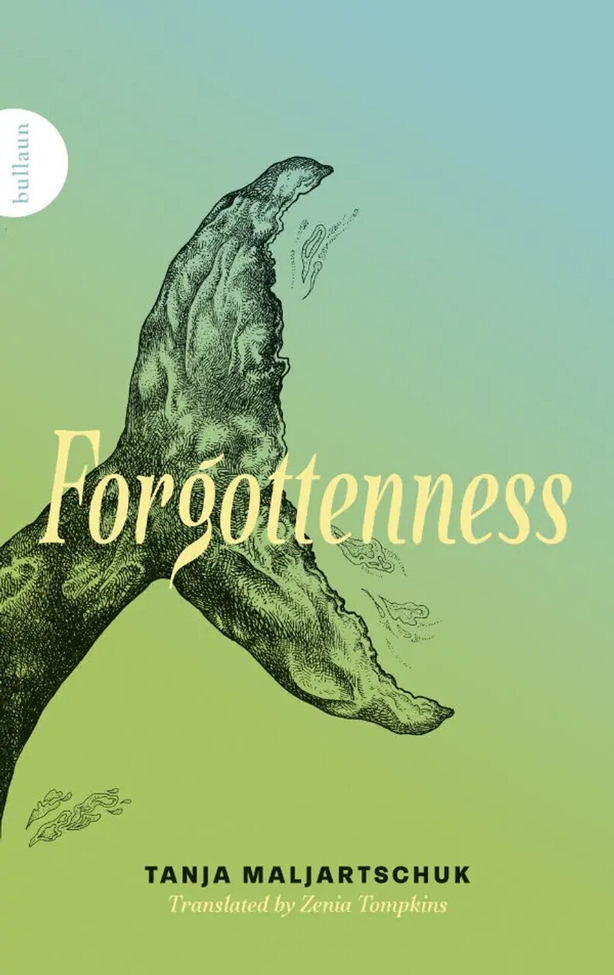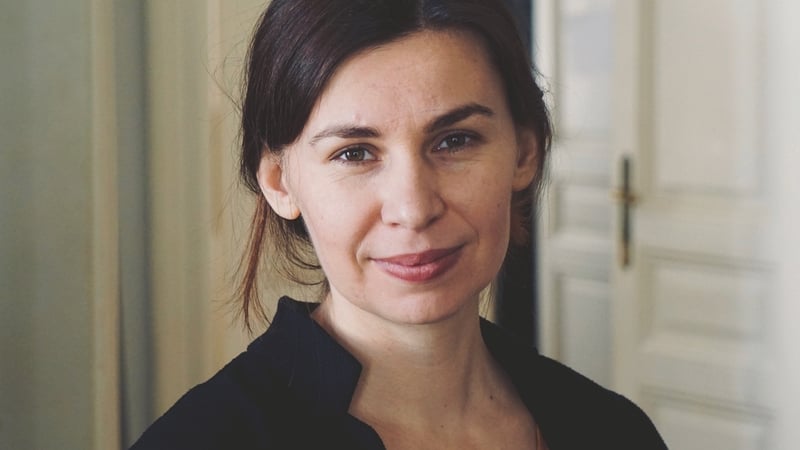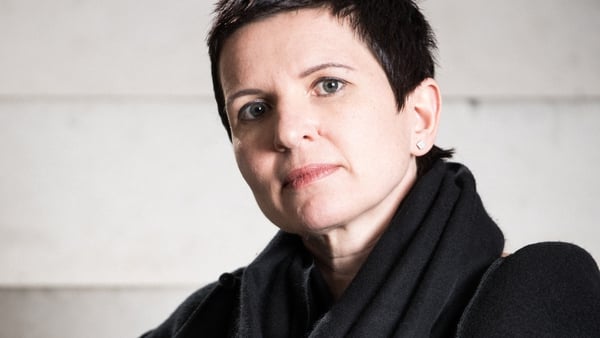We present an extract from Forgottenness, the acclaimed novel by Ukranian author Tanja Maljartschuk, translated by Zenia Tompkins.
Forgottenness is a layered exploration of Ukrainian identity that painstakingly traces parallels between the historical and the contemporary, the collective and the individual, between the stories of two people born on the same day, a century apart - culminating in a profound double portrait.
Time consumes everything living by the tonne, like a gigantic blue whale consumes microscopic plankton, milling and chewing it into a homogeneous mass, so that one life disappears without a trace, giving another, the next life, a chance. Yet it wasn't the disappearance that grieved me the most, but the tracelessness of it. I thought to myself: I’ve already got one foot there, out in complete forgottenness. The process of my inevitable disappearance was initiated at the moment of my birth. And the longer I live, the more I vanish. My feelings and my emotions vanish, my pain and my joy; the places I’ve seen vanish, and the people I’ve met. My memories vanish, as do my thoughts. My conception of the world vanishes. My body vanishes, more and more every day. The world within me and around me vanishes, leaving no trace, and I can do nothing to safeguard it.
It was in the wake of this revelation that I took to reading old newspapers in large quantities. The fragility of human life in the face of the omnipotence of time can be felt most in the dusty pages of daily newspapers. There, these lives were still important. The headlines abounded with the dreams and fears of entire nations, discussions were conducted, scandals exploded, rebuttals were published, pharmacies and bookstores and travel agencies placed their ads, someone was collecting donations for war-crippled countrymen, someone else was announcing a literary soirée, and on the final page there were always one or two medio- cre poems with patriotic themes, for the soul, until suddenly, poof ! – and this gurgling time of the present had become the past, the mouth of the blue whale was already open and was beginning to gulp it all down, the editor sorrowfully shared that due to a lack of funding the newspaper was halting circulation, 'but not for good!’ And not a single issue more. The end. Time had prevailed. The blue whale was swimming away.
That’s what happened with the first Ukrainian newspaper, Dilo (Deed), which was published from 1880 to 1939 in Lviv. In 1939, a centuries-long history of this city came to a close. The Red Army’s entry into Lviv that year initiated a new – Soviet – era, the particular predilection of which was the killing of the past and a ban on memory.
That’s what also happened with the other large Ukrainian newspaper, Rada (Council), which was published daily in Kyiv from 1906 to 1914. The publisher, Yevhen Chykalenko, had been forced to contribute considerable funds from his own pocket so that the newspaper would continue to exist because no one subscribed to it. The First World War addressed this problem in a definitive manner, and Yevhen Chykalenko breathed a sigh of relief because his conscience wouldn’t have permitted him to shut down the newspaper himself. He said that a newspaper was like a flag: if it was flying, that meant Ukraine was still in existence.
But the fate of the newspaper Svoboda (Liberty), which the Ukrainian community in America began to publish in New York back in 1893 and still publishes to this day, was entirely different. This newspaper became my favourite not because it was the best, but because it saw everything and forgot nothing. One hundred and twenty uninterrupted years. Six generations of people united by one chronology. The murder of Franz Ferdinand in Sarajevo and the fall of the Soviet Union, or events on Ukrainian lands, like the fire in Husiatyn in 1893 and the Bolekhiv butcher Anton, who in 1934 cut off his own mother’s head with an axe. Or, for another example, the 20 June, 1931 issue, which reported in its pages that the gangster Al Capone had been arrested in Chicago.
I mulled over this information for a moment, attempting to imagine what was going on in another part of the world that same year, in the villages of my grandmothers and grandfathers for instance, but the only thing that kept popping into my mind was that the women in those Ukrainian villages didn’t wear underwear because they simply didn’t have any, and routinely, when the need arose, had to sit at home so that no one would see the ritual blood trickling down their calves.
Only later did my attention migrate to the big black upper case letters on the front page, which only an unscrupulous reader could have skipped past in favour of the arrest of a Chicago gangster. Three words in total, stamped in black ink. It was impossible to not see them. An eerie chill swept down my back. I reread the headline over and over until I stopped feeling anything. Over and over:
VIACHESLAV LYPYNSKYI DEAD
At the time, I didn’t know who he was or how he had died. But the death of this man must have been of considerable importance to someone in the Ukrainian diaspora if Svoboda was reporting it on the front page, neglecting the fates of Al Capone and his New York counterpart Dutch Schultz, who would also be thrown in jail days later. The announcement that the Russian writer Maxim Gorky had been admitted into the ranks of the Communist Party likewise didn’t outweigh the death notification in importance, nor did the suicide of the wife of the Rabbi of Vilnius, the cause of which was apparently a ‘nervous disorder.’ In this issue of Svoboda, nothing was more important than the death of Viacheslav Lypynskyi. In contrast to the hapless wife of the rabbi, whose name went altogether unreported, Lypynskyi’s name needed no explanation, otherwise he wouldn’t have been written about in the spot typically reserved for some sort of global catastrophe, such as, say, the devastating 1906 earthquake in San Francisco.
I read the obituary below the black headline. An eminent historian and a prominent politician. He had left instructions to have his heart pierced after his death because he feared being buried alive. The heart puncture was performed in the Austrian sanatorium Wienerwald, the same one where the little-known writer Franz Kafka had unsuccessfully undergone treatment a few years earlier. Lypynskyi’s daughter Ewa and his brother Stanisław served as witnesses to the procedure.
At that same time, in June 1931, my paternal grandfather had just turned five years old. His mother, my great-grandmother, who didn’t own any horses, used to harness herself to a plough in order to till up a hectare of land, and signed her name with an X. Their homeland, Ukraine – or more precisely, Eastern Halychyna – was still a part of Poland then.
My maternal grandmother was also alive then. Her mother, another great-grandmother of mine, had the best voice in her parts, but few got the chance to enjoy it because she died immediately after giving birth to her daughter. Her widower, a once-prosperous grain farmer, left his daughter on the steps of an orphanage and himself died of starvation in 1933. Their homeland – Malorossiia or ‘Little Russia,’ the Greater Ukraine that straddled the Dnipro River, the original Ukrainian Soviet Socialist Republic – was de facto a part of Russia. Though can a land that kills really be called a ‘homeland’? I don’t know. I had ended up right in the belly of the blue whale. Swallowed whole, I still had the chance to resuscitate my story. Mine and his, Viacheslav Lypynskyi’s. My story through his story. I needed only to pretend that no one’s heart had been pierced and that it was still beating. Just now, in my throat.

Forgottenness is published by Bullaun Press

